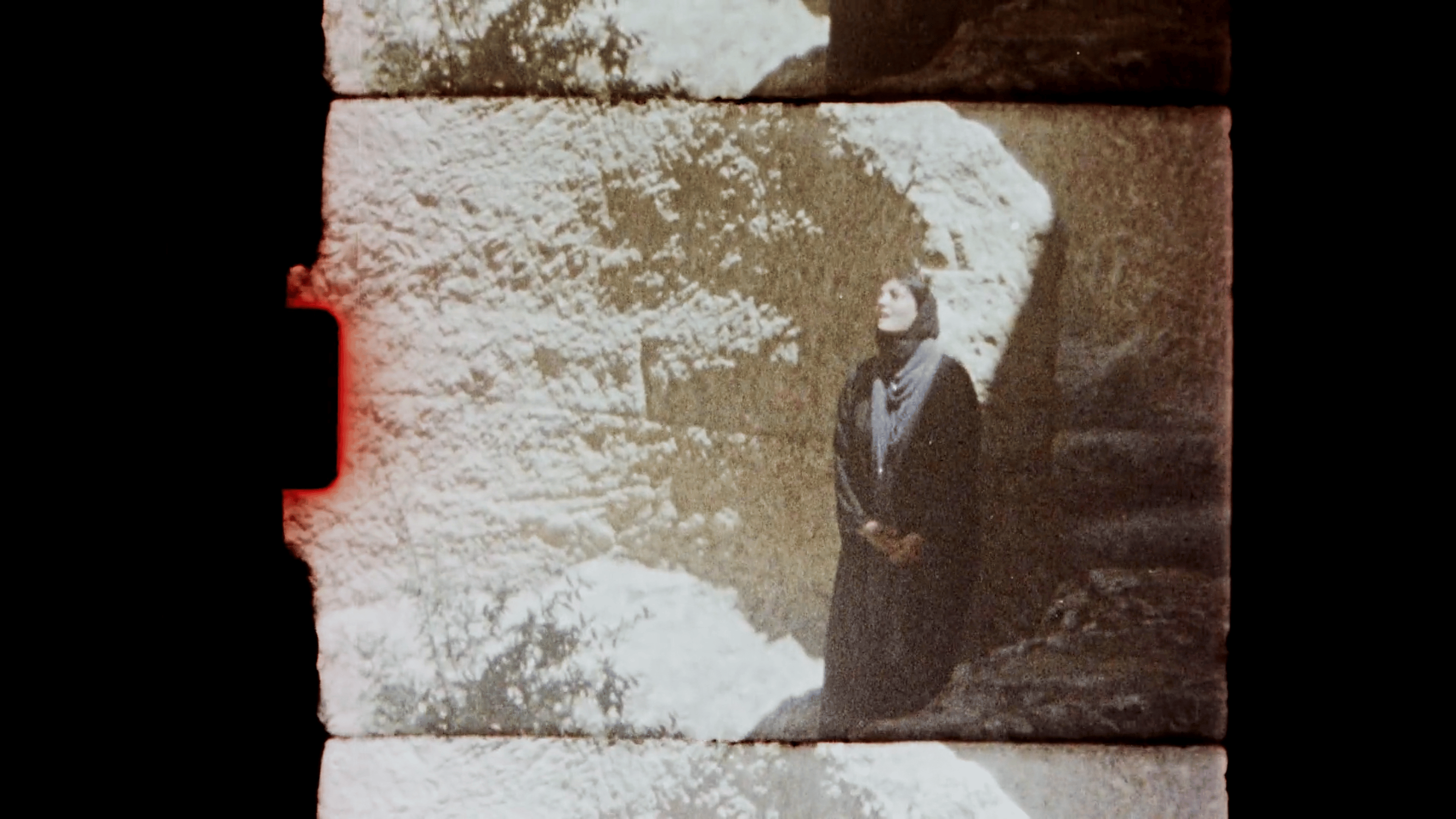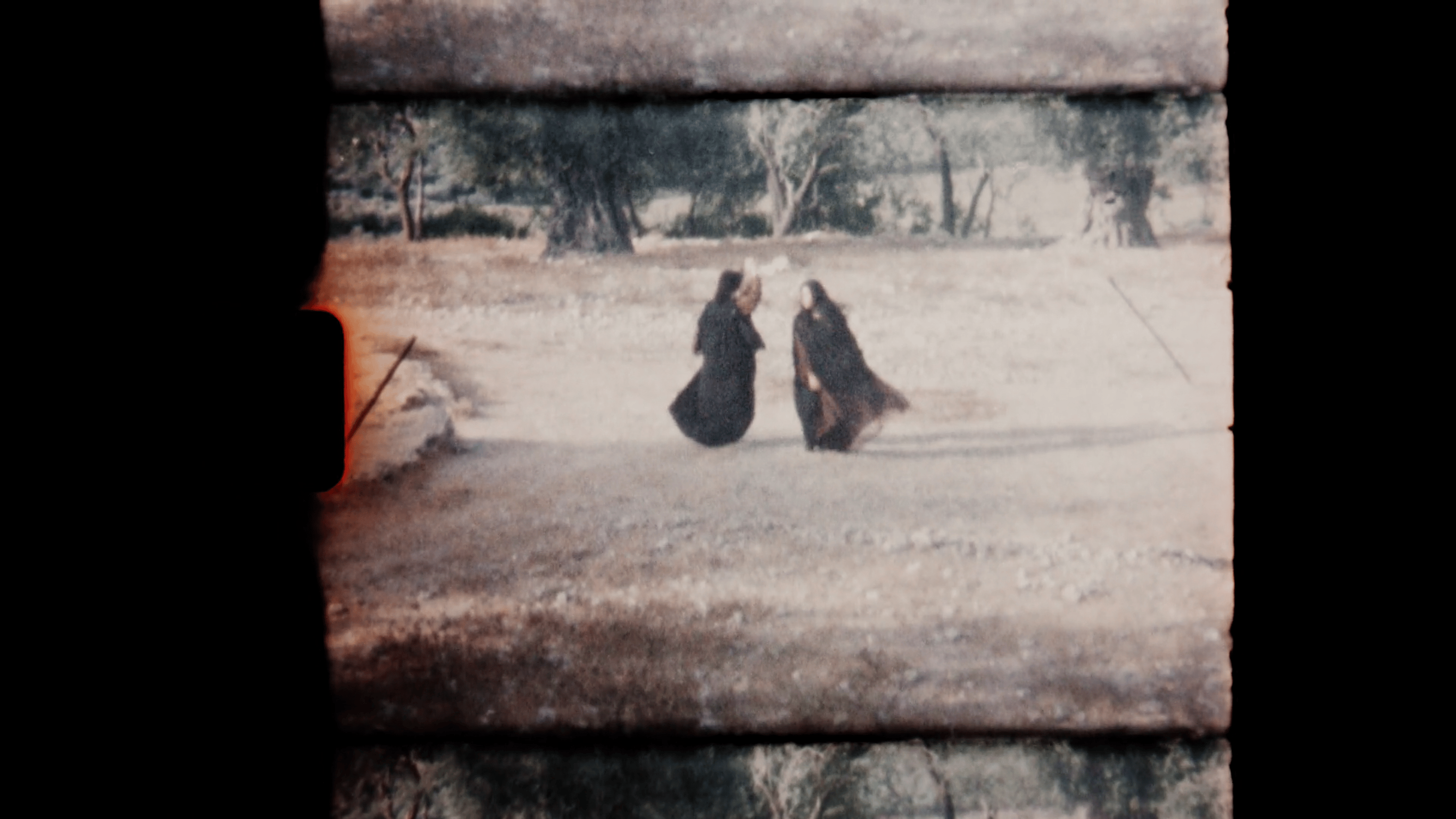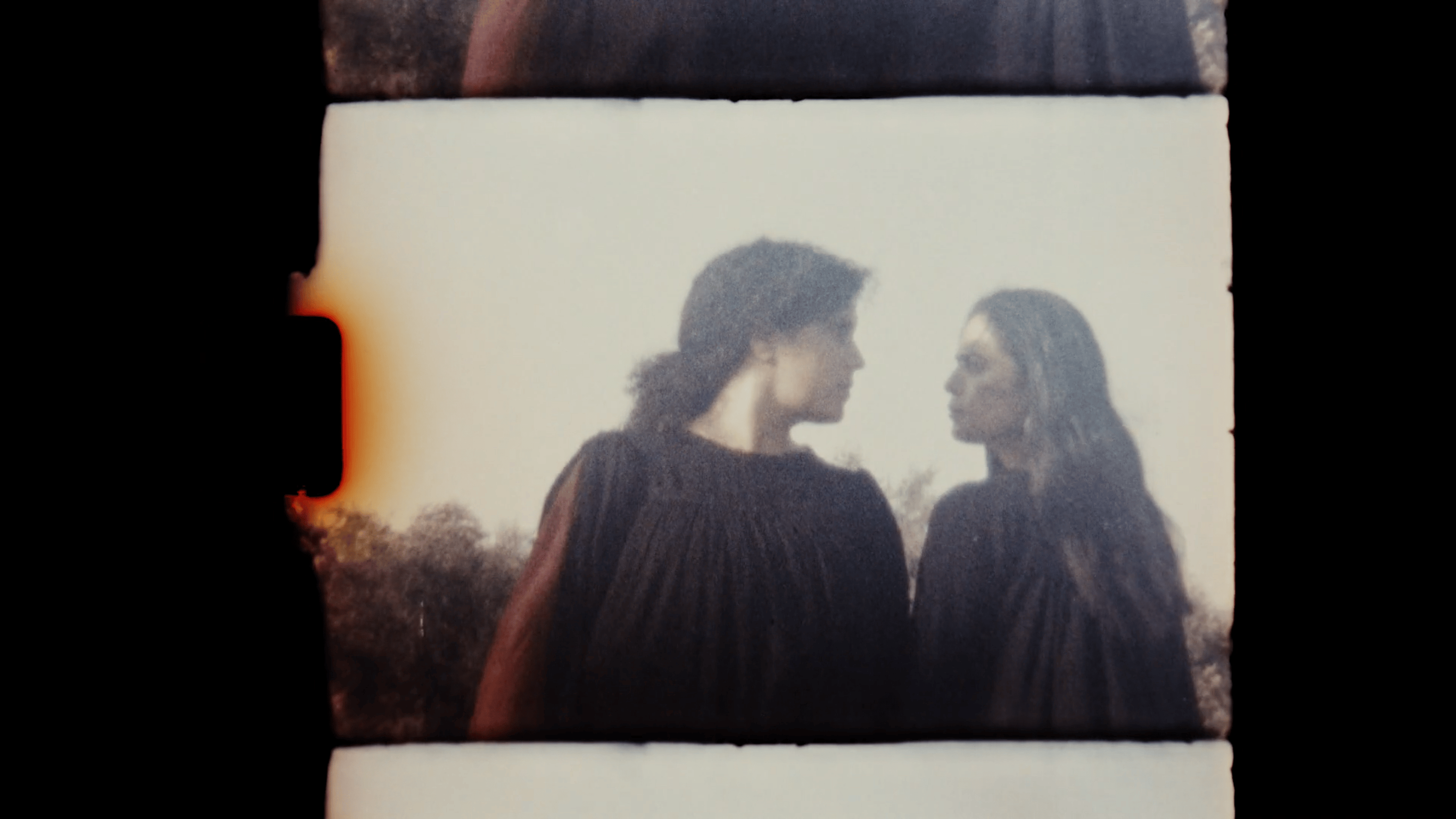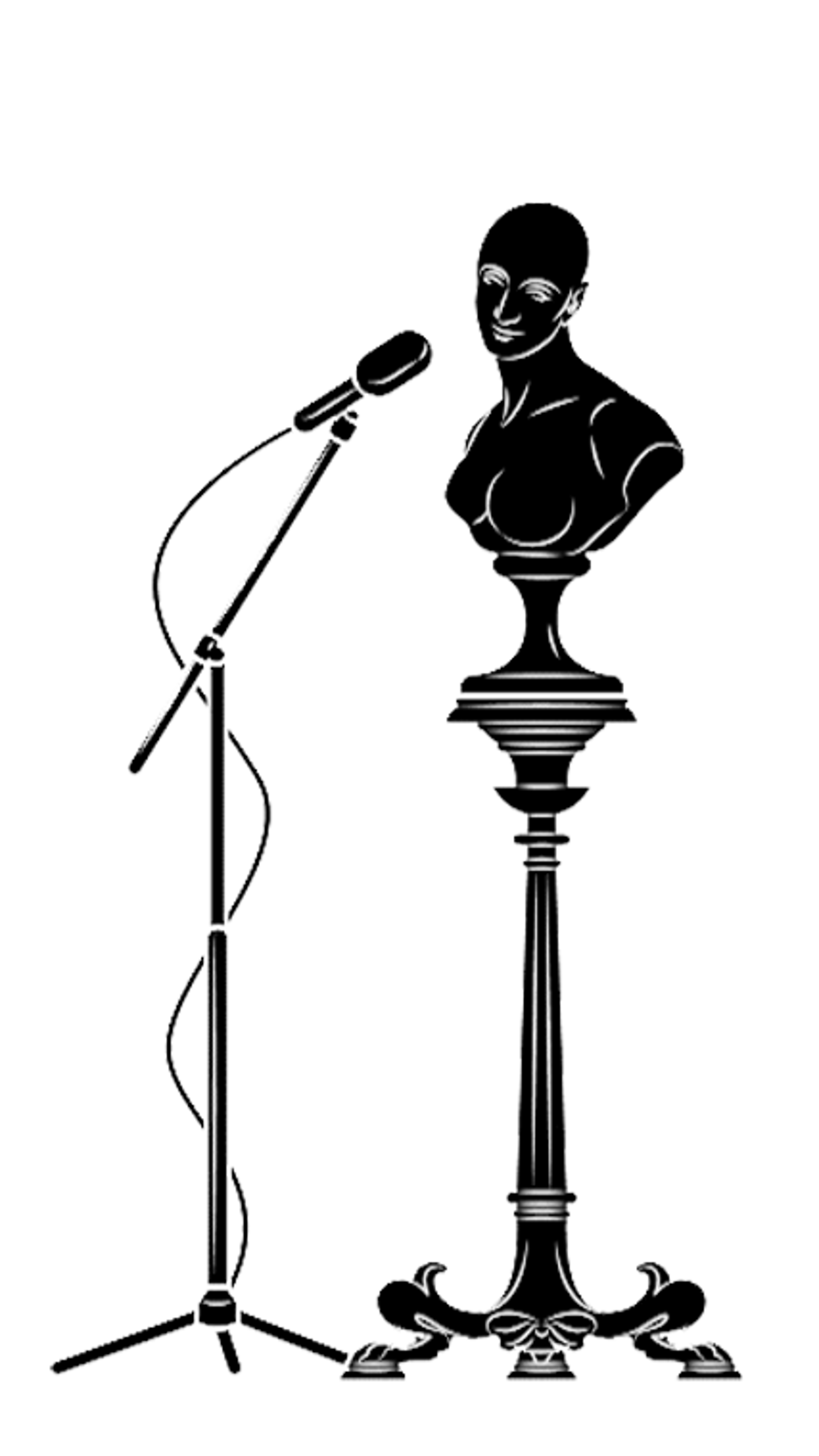Noor Abed’s recent films address the rich history of Palestinian folklore and musical archives through choreographed vignettes recorded on 16 millimetre film formats. Vintage film aesthetics are a way to claim back erased histories and connect with a past that is constantly threatened with being dismantled. Abed’s performers act in collective repetitions that mirror rituals of mourning and memorial. Her films critically examine how movement, dance, and song hold communities together and perpetuate the possibility of collective resistance.


Based on compilations of Palestinian folktales, Abed’s performers incarnate Palestine’s undivisible connection to its literary past. Peasant dances, wails into the landscape, and the connection between the earth and the body manifest in this dream-like sequence from the region’s magical imagination.


An original audio recording called “Song for the Fighters” accompanies this clip of a group of people travelling along desert roads. A timeless landscape preserves the graves of ancestors as the camera travels across the seemingly endless arid hilltops of Palestine.

The following folktale is from the book “Speak Bird, Speak Again: Palestinian Arab Folktales” edited by Ibrahim Muhawi and Sharif Kanaana which is one of the main references for Noor Abed’s Our Songs Were Ready for All Wars to Come (2021). It is a compilation that records various fables in English translation and records this often oral aspect of Palestinian culture. The following tale is titled:
Once there was a father, a merchant with three daughters. Two were from one mother, while the third was from a different mother. She was the youngest of the three and very beautiful. Her father loved her very much, and had given her the name of Sitt il-Husun.
Wanting to go on the hajj, the father one day asked his daughters what they wished. "Name something I can bring back with me," he said.
"I want a gold bracelet," announced the eldest. "And I want a dress embroidered with the most expensive silk," said the second. "As for me, father," said Sitt il-Husun, "I want Jummez Bin Yazur, Chief of the Birds. And if you don't bring him to me, may your camels collapse in Aqaba and be unable to move!"
The father went, completed the hajj, and returned. On the way back his camels collapsed in Aqaba, and he remembered. "Ah, yes!" he thought. "By Allah, I've forgotten to bring Jummez Bin Yazur, Chief of the Birds." Returning [to Mecca], he wandered around the city asking about Jummez Bin Yazur, Chief of the Birds. Finally he came upon an aged sheikh, who gave him directions to Yazur's house. "Go stand by his door," the old man said, "and call out three times, 'Jummez Bin Yazur, Chief of the Birds! My daughter has asked for you.'"
The father walked and walked, until he reached the house described by the sheikh. It was a hot day, and he was thirsty. Seeing a water jar by the door, he reached out his hand to drink, but listen! "Take your hand away!" said the jar. "May it be cut off! You dare to drink from your master's house?" He was afraid, poor man! Stepping back, he shouted out three times, "Jummez Bin Yazur, Chief of the Birds! My daughter has asked for you!" and headed straight home.
Three nights after he arrived, look! a bird was beating his wings against Sitt il-Husun's window. She got up and opened it for him, and he came in. Fluttering his wings, he turned into a youth, one of the handsomest of young men. Every night after that he came and stayed with her, and at dawn he would turn back into a bird and fly away, leaving her a purse full of gold under the pillow.

Still image from Our songs were ready for all wars to come, 2021
Her sisters found out, and jealousy crept into them. One day her eldest sister came and said, "Ask Jummez what's most precious to him where he comes from." Now Sitt il-Husun was simple and innocent of heart, and when he came in the evening, she asked, "What does you most harm in your natural environment?"
"Why?" he asked. "What do you want?"
"Because," she answered, "I just want to know." And she kept after him till he told her the thing that did him most harm was glass. If a piece of glass were to cut him, he would never be able to recover.
When she told her sisters, they went behind her back and broke the glass of the window where he came in. That evening when he came to visit her he tried to pass through the window, but the broken glass wounded him. Away he flew, back where he came from.
Sitt il-Husun waited a day then two, a week then two, and when he did not come back, she realized her sisters had tricked her and that Jummez was now sick. Putting on the disguise of a beggar, she wandered from one place to another in search of him. One day while she was sitting under a tree, two doves landed in the branches and began a conversation.
"You see, sister," said one, "it turns out Jummez's wife had been wanting to kill him."
"If only there were somebody," replied the other, "(Far be it from my feathers and yours, and my blood and yours!) if there were someone who would slaughter a dove, drain her blood and mix it with the feathers, and then rub it on his legs, he'd get well again."
Sitt il-Husun rose up. She went and got a dove, slaughtered it, drained its blood, burned its feathers. Mixing them together, she carried the medicine with her and wandered about the city, calling out, "I am the doctor with the cure!"

Still image from Our songs were ready for all wars to come, 2021
One day she passed in front of a certain house, and listen! there were girls crying by the window. When they saw her, they called her up, saying their brother was sick and no one had been able to cure him. Sitt il-Husun came in and rubbed the medicine into his wounds, staying up with him day and night for two weeks, until he woke up. When he awoke, he recognized her.
"O Sitt il-Husun!" he cried out. "You did me a great wrong!"
"It wasn't me!" she answered. "My sisters did that to you."
"It's no matter," he responded. "Don't let it worry you."
When his sisters discovered she was his sweetheart and he wanted to marry her, they said, "You can't marry our brother until you've swept and mopped this whole town."
She started to weep, but Jummez said, "Go to the top of that mountain and cry out, 'O you there, sweep! O you thing there, mop!'" Going to the top of the mountain, she did as he had told her, and indeed, the whole town was swept and mopped.
Seeing that she had accomplished that, the sisters said, "You won't marry our brother until you've brought enough feathers to fill ten mattresses for the wedding." She went crying to Jummez, but he said, "Don't be afraid. Go up the mountain and repeat three times, 'Jummez Bin Yazur, Chief of the Birds, is dead!'" Going back to the top of the mountain, she called out three times, "Jummez Bin Yazur, Chief of the Birds, is dead!" No sooner had she said it than all the birds gathered and started wailing and lamenting, plucking out their feathers over their chief. Soon there were piles and piles of feathers on the ground.
Gathering the feathers, she took them to Jummez's sisters, but they said, "You can't marry our brother until you've fetched the straw tray hanging on the wall of the ghouleh's house."

Still image from Our songs were ready for all wars to come, 2021
Again she went crying to Jummez. "Don't cry," he comforted her. "This one's easy! Go to the ghouleh's house, and you'll find meat in front of the horses and barley in front of the lions. Switch the meat and the barley. You'll also find the stone terrace by the ghouleh's house collapsed. Repair it, then go into the house and pull the tray down. But take care! If it scrapes against the wall, the ghouleh will wake up."
So to the ghouleh's house went Sitt il-Husun, to do as Jummez had told her. But when she went in to take the straw tray, she saw the ghouleh sleeping and shook with fear. As she was pulling the tray down, it scraped against the wall, shaking the whole world and waking up the ghouleh. Snatching the tray, Sitt il-Husun ran with it, the ghouleh following her.
"Retaining wall, catch her!" shrieked the ghouleh."
"For twenty years I've been collapsed, and she repaired me," answered the wall. "I won't do it."
"Horses, catch her!" commanded the ghouleh.
"For twenty years we haven't tasted barley, and she fed us. No!"
"Lions, catch her!"
"For twenty years we haven't tasted meat, and she fed us. No, we won't!"
Thus the ghouleh was not able to catch her, and Sitt il-Husun brought the tray and presented it to Jummez's sisters. When they were satisfied that she had done all her tasks, they gave their consent to their brother's marriage.
They held wedding celebrations. Sitt il-Husun married Jummez Bin Yazur, Chief of the Birds, and he lifted her up and flew away with her.
The bird has flown, and a good night to all!

